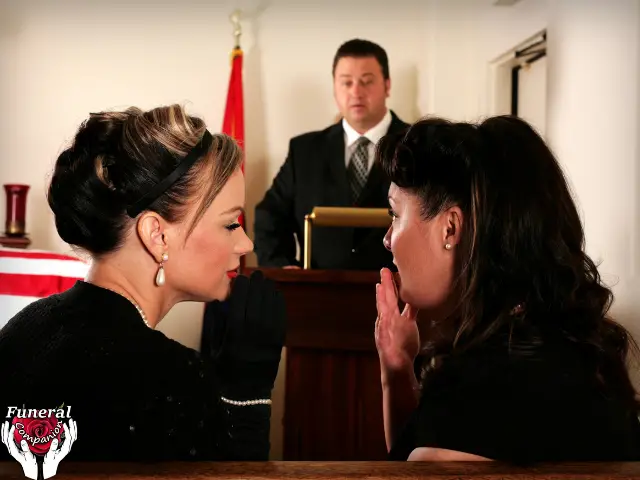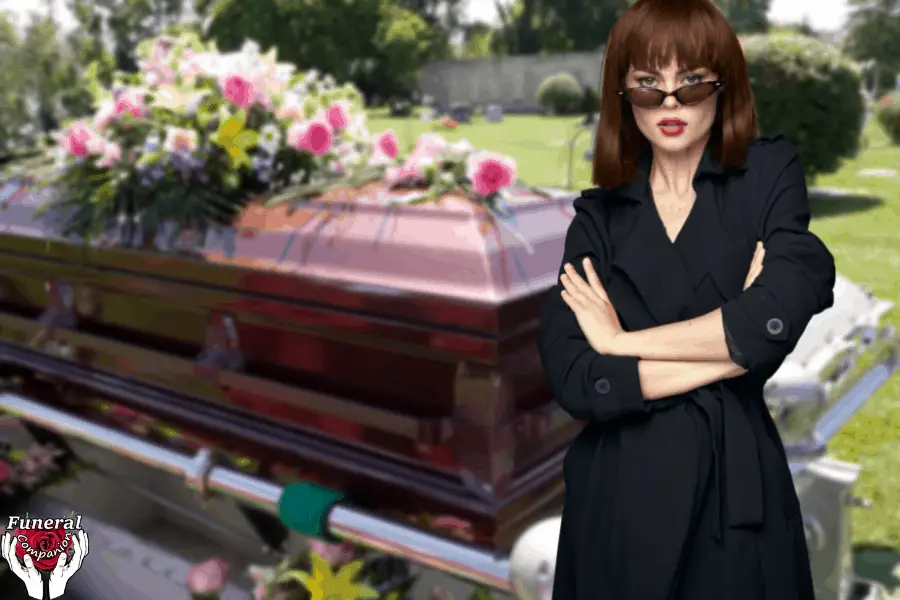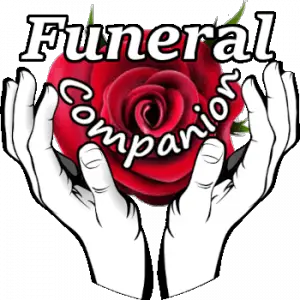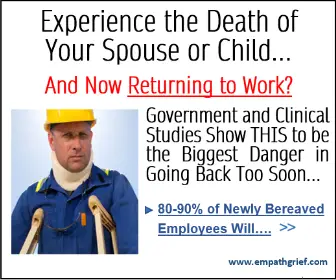I come from a very large family, over 25 grandchildren alone, and when my grandparents died recently it was tough to decide who would speak at their funeral. You may be facing this decision yourself, whether you have had a recent bereavement or are even planning your own funeral.
The ideal candidate to speak is a close friend or relative (other than the spouse) who will fill three out of the four traditional speakers during funeral services. When these candidates are unavailable, officiants or funeral directors will fulfill the most vital role of giving the eulogy.
Before you and your family make the decision over who will be speaking at the upcoming funeral, please feel free to read the rest of this article. I have put together quite a few tips and useful bits of information to help you make the right choice.
Who normally speaks at funerals?

Often, there are four types of speakers at a funeral. When conducting a religious ceremony some sort of liturgy will be spoken which may be supplemented with readings. There is also usually a eulogy given by a close friend or relative. Nowadays, the floor is even opened up for impromptu farewells.
Nevertheless, if you are conducting a more traditional funeral, you may scrap the last option and opt for more scripted speakers which you can rely on.
This means that you can count on the officiant, your religious leader, or funeral home director, to conduct the funeral and keep things moving along. You will also need to have someone prepare a eulogy of some sort as most members of the congregation will expect this.
An additional feature of most funerals is at least one reading, either from a religious text or something like a poem. A good option here is to pick a bible verse (if that is appropriate) or a poignant quote.
Finally, you have the option to simply set up a microphone and invite members of the congregation to share a few memories or words about the deceased.
Who can give the Eulogy?
As every eulogy is different, as every person is different, it’s usually best coming from someone who knew the deceased best. When my granddad died, my older brother gave the eulogy as he was the oldest grandchild and my uncles and aunts decided this would be best for them.
Now, this option may not work for everyone, so here is a list of the types of people who can be called upon to give a Eulogy.
Eulogy speaker #1 A child
One of the best people to give a eulogy is the deceased adult child. Although this can be incredibly emotional for the speaker, it’s often a child that a person’s life has the most impact on. This is also an age-old tradition of the offspring honoring their parents.
Eulogy speaker #2 A grandchild
As with my family’s case, an adult grandchild can also be an excellent choice for giving a eulogy about a grandparent. Even though they may have been there for even less of the deceased life, this does not stop them from giving a fitting send-off to their Gran or Grandpa.
Eulogy speaker #3 A sibling
A brother or a sister is also an excellent candidate for giving the eulogy because they have known the deceased all their lives and this can produce a eulogy that engages the entire congregation.
Eulogy speaker #4 A close friend
An alternative to family or if none is available or willing is a good friend. Oftentimes, friendship can be a closer bond than even family and this can lead to a speech that the deceased would have really appreciated hearing.
Eulogy speaker #5 A business associate
Again, as an alternative to family or friends, a business partner or colleague is also a good choice. This is especially true if the deceased dedicated much of their lives to their business or career and this is something they would want to be celebrated at their funeral.
Eulogy speaker #6 A spouse
I’ve put a spouse lower on the list purely because most widows and widowers don’t speak at their spouse’s funerals. There is no law or rule of etiquette against this, it’s purely just a practical practice as this must be one of the most difficult days they will ever need to face.
Eulogy speaker #7 A religous leader
Some families, especially in a close-knit religious community, may look to their religious leader to give the eulogy. This is because for the deceased and the family, their earthly conduct in the eyes of God is what counts and it gives comfort to all those around.
In some cases where there is no one else to speak, the religious leader will naturally step in to fill this role in the service.
Eulogy speaker #8 A funeral director
When the funeral is being conducted in a secular way and there are no other speakers, the funeral director will usually give a few words to honor the dead. This will usually happen even if the funeral is a particularly small one or it is being carried out for an unclaimed body.
Who should give funeral readings?
Giving a reading, whether is it from a religious text or from a poem, you really want to choose the right sort of person. Having given many readings in public, I know that not everyone is up to the task.
Ideally, a reading should be read by a relative or friend to the deceased. Adults are preferable, but teenagers can also do an outstanding job. It’s always to ask for a volunteer rather than enforcing the role on someone and requesting a particular extract will also improve the overall results.
For most families, you don’t want to add to the emotion of the day or have anyone cause an awkward scene by balling their eyes out at the lectern. So, try to choose someone who is not in the throes of grief. The perfect person to give a reading is normally a friend or colleague as they will be bereaved but not to the same extent as a close relative.
Volunteers – Can anyone speak at a funeral?
Ultimately, who speaks at a funeral is down to the discretion of the family organizing it and/or the venue holding the event. On some rare occasions, some religious groups will have strict rules on how a funeral is conducted.
So, as the organizer of the funeral, you can choose to open the floor up to those who want to share their fondest memories of the deceased. Many people will want to and they will thank you for the opportunity to do so.
In order to make this part of the funeral go more smoothly, you can do a number of things to help.
Firstly, give a warning of this part of the proceedings in your invitation and/or funeral program. This will give people a chance to think about what they would like to say. Another thing you can do is to ask some family members or friends to start, this will get the ball rolling and encourage others to participate.
Is it rude to not speak at a funeral?

Legally and ethically, there is nothing saying that you should speak at a funeral. You are allowed to grieve in any way that you feel necessary, and if that means not speaking at a funeral that is fine. Perhaps the only time it would be rude is if you have been asked, said you would speak, and then refused to do so.
There are two cases where people may actually expect you to speak, so let’s look at them in a little more detail:
Is it Ok not to speak at your father’s funeral?
Although it may be expected that you speak at your father’s funeral on your mother’s behalf, this isn’t always the best option. When grief or some other strong emotion will lead you to add to your own suffering or that of others, not giving a eulogy is the better option. The hardest part may be explaining this to others.
If you would like to read more about this, I have written an entire article on when it’s acceptable NOT to give a eulogy at your father’s funeral.
Can you refuse to speak at your mother’s funeral?
Refusing to speak at your own mother’s funeral is actually a good decision in some cases. Sometimes children are incapable of talking about their Mom at this time. Oftentimes, speaking while dealing with any pent-up feeling may also lead to a scene that you later regret.
So, if you need to make the difficult decision of NOT speaking at your mother’s funeral, feel free to read my full article here.
When is the eulogy read at a funeral?
Traditionally the eulogy is read as part of the funeral service, which can happen in a place of worship, a funeral home, or even at the graveside. Eulogies can also be read as part of a wake. Often they are read when the most people are able to hear them and reflect on the passing of the deceased.
If you are planning your first funeral, don’t worry as the funeral home you are working with can answer your question about when to program the eulogy as well as other funeral questions you may have.
Who reads the obituary at a funeral
Usually, an obituary is not read at a funeral. Obituaries are printed biographies of a deceased’s life and usually proceed the funeral as well as announce it. Another form of spoken biography, known as a eulogy, is what is read at a funeral.
However, there is no rule that says that both a eulogy and an obituary cannot be read out aloud at a funeral. Nor is there any rule that says the eulogy cannot just be a verbal delivery of the previously printed obituary.



